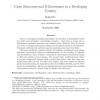Free Online Productivity Tools
i2Speak
i2Symbol
i2OCR
iTex2Img
iWeb2Print
iWeb2Shot
i2Type
iPdf2Split
iPdf2Merge
i2Bopomofo
i2Arabic
i2Style
i2Image
i2PDF
iLatex2Rtf
Sci2ools
109
Voted
EGOV
2009
Springer
2009
Springer
Caste Structures and E-Governance in a Developing Country
Castes, or endogamous kinship relationships, are prevalent in communities across the world and particularly in developing countries. Caste plays a strong role in determining community structures and political power. However, the role of caste as a factor in shaping e-governance design and outcomes is absent in the literature. This paper addresses this particular gap by examining some cases from India. The paper specifically considers whether the priorities of dominant caste groups determine e-governance design and implementations, to the exclusion of marginal
Caste | E-governance Design | EGOV 2009 | Endogamous Kinship Relationships | Information Management |
| Added | 16 Aug 2010 |
| Updated | 16 Aug 2010 |
| Type | Conference |
| Year | 2009 |
| Where | EGOV |
| Authors | Rahul De' |
Comments (0)

